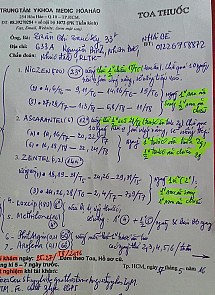A Vietnamese mother suffering postpartum depression has been prescribed over 400 pills of 17 types of medicine.
N.T.T.L., 33, residing in Ho Chi Minh City, had no other choice but to follow a prescription worth VND3.9 million (US$174.5), an unusually high value in the Vietnamese context, despite her concern and confusion.
L. gave birth to her daughter via in vitro fertilization in 2011 before beginning to suffer depression, evidenced by the fear of her own child and her occasional intention to murder the kid.
While her mental state was alleviated by the help of her family members, in 2013 L.’s daughter went through a serious illness, resulting in the mother’s intention to end her life as well as her daughter’s.
The woman then sought treatment at the Hoa Hao polyclinic in District 10 and a private clinic near her home, but the doctors there all failed to prevent her mental problems from recurring.
L. was diagnosed with sinus infection after receiving a magnetic resonance imaging (MRI) scan at Cho Ray, the largest general hospital in the southern metropolis, in December last year, and later a depression by doctors at a private infirmary.
Prescriptions from both facilities did not help L. recover from her health issue, leading to the woman being introduced to the private establishment of N.H.H. last month, who was a doctor at the Hoa Hao polyclinic.
After listening to L.’s story and examining her previous MRI result, H. concluded that she could be infected with a brain parasite, asking the woman to undergo blood and urine tests, abdominal ultrasounds, a gynecological examination, and another MRI scan.
Based on the tests, the doctor diagnosed L. with headache and neurological disorders, before prescribing a total of 17 types of medicine for the patient.
The prescription included three types of de-worming pills, three kinds of liver antidotes, four painkillers, three types of sleeping pills, three varieties of dietary supplements, and a type of virginal tablet.
Unreasonable prescription
Associate Professor and pharmacist Nguyen Huu Duc, who works at the University of Medicine and Pharmacy in Ho Chi Minh City, stated that the medical instruction was unreasonable.
One of the de-worming pills was ascarantel, which should only be used if the patient is definitely infected with a parasite, Du said.
Among the three types of sleeping pills, one was specifically for the treatment of Schizophrenia, the expert added.
“The combination of panadol and balarat is likely to cause an overdose,” he elaborated.
According to Phan Thanh Hai, director of the Hoa Hao polyclinic, several doctors and the scientific council of the infirmary discussed the prescription and also worked with doctor H., who said he ordered such a complicated medication as L.’s illness was difficult to treat.
The practitioner also presented several researches as scientific grounds for his treatment method, Hai added.
H., who is nearly 70 years old, was previously a neurologist at the Cho Ray Hospital and has conducted recognized research on a similar method, the director stated.






















































